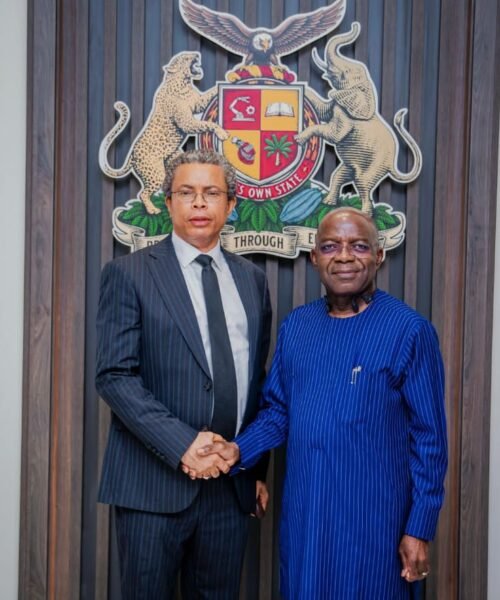Nigeria’s AI Market: Projected to Reach $644.4 Million by 2025
We have reliably learnt that Governor Otti has set up a private think tank to study the global mainstreaming of AI infrastructure which is becoming a pressing priority for nations worldwide. This is so because the concept of “sovereign AI” has emerged, emphasizing the importance of countries developing their own AI capabilities, using their own data, workforce, and business networks.¹ This shift is driven by the growing recognition of AI’s transformative potential and the need for countries to maintain control over their sensitive data and AI systems. He believes that Abia tech community can be energized to broaden the application in the soon to expanded smart school initiatives. He’s currently bugged down with revamping the school infrastructure state wide, then selecting pilot schools for the robust roll our in his first tenure.
Key Drivers of Sovereign AI
National security, economic growth, and data sovereignty are the primary drivers of sovereign AI. Countries want to ensure their data is stored and processed within their borders, in line with their laws and regulations. According to a report by the Center for Strategic and International Studies (CSIS), 71% of countries consider AI a critical component of their national security strategies.³
Global AI Power Rankings
The Stanford Institute for Human-Centered AI has developed a tool to rank countries based on their AI capabilities. The top three countries in the Global AI Power Rankings are the United States, China, and the United Kingdom.² The United States leads the rankings, with a score of 44.8, followed closely by China, with a score of 32.3.
Investments in AI Infrastructure
Nvidia has earmarked $110 million to invest in AI startups and help countries develop their sovereign AI infrastructure. Other companies, like Scaleway, are also investing in regional AI clouds to support AI advances in Europe. According to a report by McKinsey, global investment in AI is expected to reach $190 billion by 2025, up from $15.7 billion in 2016.⁴
AI Adoption Rates
AI adoption rates vary significantly across industries and countries. According to a report by Gartner, 37% of organizations worldwide have deployed AI in some form, with the highest adoption rates in the healthcare (43%) and finance (42%) industries.⁵
As nations mainstream AI infrastructure, they face challenges like energy consumption, data security, and workforce development. However, they also have opportunities to drive economic growth, improve national security, and enhance their global competitiveness. According to a report by PwC, AI could contribute up to $15.7 trillion to the global economy by 2030.⁶
Workforce Development
Workforce development is a critical component of mainstreaming AI infrastructure. Countries need to invest in education and training programs that equip their workforces with the skills required to develop, deploy, and maintain AI systems. According to a report by the World Economic Forum, 75 million jobs may be displaced by AI, but 133 million new roles may emerge.⁷
Mainstreaming AI infrastructure is a pressing priority for nations worldwide. As countries develop their sovereign AI capabilities, they must address the challenges and opportunities associated with AI adoption. With the right investments in education, training, and infrastructure, countries can unlock the transformative potential of AI and drive economic growth, improve national security, and enhance their global competitiveness.
Donald Trump’s AI strategy is built around maintaining American leadership in artificial intelligence, with a focus on strategic competition with China, existential risk management, deregulation, and innovation. A key component of this strategy is the American AI Initiative, established via Executive Order 13859 in February 2019, which aims to promote AI development and adoption in the United States.¹ This initiative has been followed by significant investments in AI infrastructure, including a recent announcement of up to $500 billion in private sector investment to fund artificial intelligence infrastructure.
Trump’s AI strategy also emphasizes the need to restrict China’s access to critical AI development resources and manage catastrophic AI risks. The strategy promotes innovation and competition in the AI industry, while advocating for deregulation to enable the development of new AI technologies. According to experts, the Trump administration is expected to create a “pro innovation” and “pro AI” platform, with a focus on optimism and necessity in keeping the lead in AI technology vis-a-vis China.² The administration is also likely to revoke the Biden-Harris administration’s AI EO from October 2023 and take a “deregulation” approach to AI policy.
The UK’s AI strategy prioritizes responsible AI development, with a focus on benefiting society as a whole. The UK has committed £1 billion to AI research and development, with a focus on areas like healthcare, transportation, and education.¹ In contrast, China’s AI strategy aims to make the country the world leader in AI by 2030, with a focus on driving economic growth and military modernization. China has committed to invest over $1.4 billion in AI research and development by 2025.²
A key difference between the two countries’ AI strategies is their regulatory approach. The UK takes a more relaxed approach to regulating AI, encouraging responsible development through guidelines and regulations.³ In contrast, China exercises significant control over AI development, with strict regulations and censorship. This approach has enabled China to drive rapid AI adoption, with the country’s AI market expected to reach $1.1 trillion by 2030.⁴
The UK and China also differ in their approach to international collaboration. The UK seeks to collaborate with other countries to advance AI research and development, while China prioritizes domestic innovation and self-reliance. Despite these differences, both countries recognize the importance of AI in driving economic growth and competitiveness. According to a report by PwC, AI could contribute up to $15.7 trillion to the global economy by 2030.⁵
Nigeria is witnessing a significant surge in AI adoption, with 34% of Nigerian businesses already leveraging AI solutions.¹ This trend is expected to continue, with 62% of businesses planning to increase their AI investment in the next two years.¹ Nigeria’s AI market is projected to reach $644.4 million by 2025, growing at a Compound Annual Growth Rate (CAGR) of 33.5%.²
AI applications are being explored across various sectors in Nigeria. For instance, 55% of Nigerian banks use AI-powered chatbots to enhance customer service.³ The Nigerian government has also launched an AI-powered platform to improve tax collection and reduce revenue leakages.⁴ Moreover, 71% of Nigerian healthcare providers utilize AI-powered diagnostic tools to enhance patient outcomes.⁵
Nigeria boasts a growing pool of AI talent, with over 10,000 AI professionals in the country.⁶ Of these professionals, 60% hold a bachelor’s degree or higher in a STEM field.⁷ This talent pool is crucial for driving AI adoption and innovation in Nigeria.
Despite the promising trends, Nigerian businesses face significant challenges in adopting AI. A staggering 75% of businesses cite a lack of skilled personnel as a major barrier to AI adoption.⁸ Additionally, 62% of businesses identify high costs as a significant obstacle.⁹ Addressing these challenges is crucial for unlocking Nigeria’s AI potential.
To fully leverage the benefits of AI, Abia State is currently prioritizing investments in AI education and training, infrastructure development, and innovation hubs. Otti believes so strongly that by doing so, the state will unlock the potential of AI to further drive economic growth, improve healthcare outcomes, and enhance customer experiences. With the right strategies in place, Abia State in Nigeria can emerge as a leader in AI adoption and innovation in Africa.

Dr Chukwuemeka Ifegwu Eke writes from the University of Abuja Nigeria.
References
- PwC. (2022). Nigeria AI Survey Report.
- MarketsandMarkets. (2022). Nigeria AI Market.
- KPMG. (2022). Nigeria Banking Survey Report.
- Nigerian Government. (2022). AI-Powered Tax Platform Launch.
- Deloitte. (2022). Nigeria Healthcare Survey Report.
- LinkedIn. (2022). AI Talent in Nigeria.
- Glassdoor. (2022). AI Jobs in Nigeria.
- McKinsey. (2022). Nigeria AI Adoption Survey.
- World Bank. (2022). Nigeria Digital Economy Diagnostic Report.






